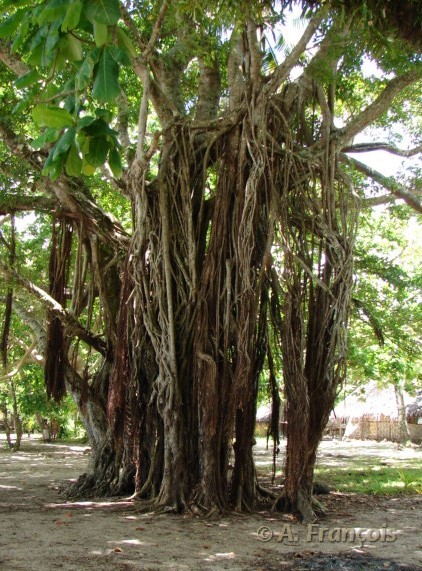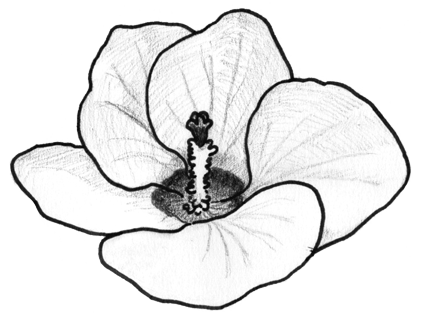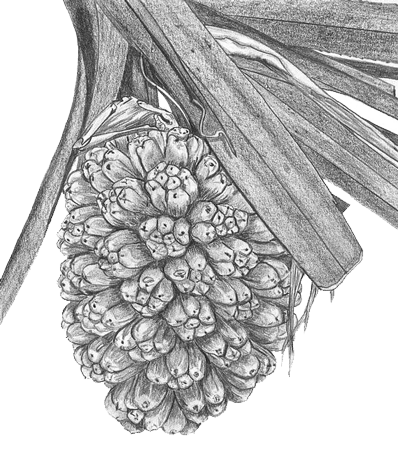va1 βa article
Grammar
the. Optional marker for definiteness, pointing to a referent already mentioned in the close contextle, la, les. Marque de Défini, opérant une anaphore contextuelle
| Va r̄aju Supe mo r̄e jeu-ja mo iso!That man Supe has overtaken us!Ce sacré Supe nous est passé devant ! |
| Mo viji va p̈ir̄a mo viji mo var̄i-a mo ling-i-a mo sa lo m̈asap̈a.He brought the woman on board, and took her out towards the deep sea.Il embarqua la femme, il la prit avec lui (dans sa pirogue), et l'emmena vers le large. |
synonymri
va-2 βa prefix
Birds
prefix for several bird names. Cf. vapune, valalaha, vakalao, vasohi, vasar̄kele, vajivjivipréfixe apparaissant dans plusieurs noms d'oiseaux. Cf. vapune, valalaha, vakalao, vasohi, vasar̄kele, vajivjivi
📙 Certains noms semblent dérivés d'autres noms d'espèces: va-karakara "martinet" ‹ kara "chauve-souris".
📘 Some names seem derived from names of other species: va-karakara "swiftlet" ‹ kara "flying-fox"
vae-as βaeas noun
Flora
fruit of a liana [as]passion fruitfruit de liane [as]grenadille, fruit de la passionPassiflora edulis.
vahuren βahuɾen verb, transitive
reject, eject; remove, tear offrejeter, éjecter; enlever, arracher
| Nene m̈ar̄a vahuren-i-a jolong botel.This is for removing corks from bottles.Ceci, c'est pour enlever les bouchons de bouteilles. |
| Mo rongo hav̈e mo hese mo var̄i-a mo plan vahuren-i-a.Feeling the presence of a crab, he seized it and threw it out.Ayant ressenti la présence d'un crabe, il le saisit et le jeta au dehors. |
| Mo vahuren-i-a kavula-na, vahuren-i-a p̈iri-na...They remove the pith, take out the seeds... |
vajaha βaʧaha noun
elders, ancestorsles vieux, les anciens
| Jara velu, jara vajaha mo velu r̄o kia.The dancing area is the place where elders used to dance.La place de danse, c'est l'endroit où les anciens allaient danser. |
| Nra vajaha mo r̄ov-i-a hija jara hosu mo re Ler̄uvahi.Elders used to call [the name of] this place "Leruvahi".Les anciens appelaient [le nom de] cet endroit "Leruvahi". |
vajivjivi βaʧiβʧiβi noun
PNCV*sivi(u)shore bird sp.
Birds
Cardinal Honeyeater, small bird, 12 cmSucrier Cardinal, petit oiseau, 12 cmMyzomela cardinalis.
seejivi
vakalao βakalao noun
Birds
Melanesian Cuckoo-shrike, Melanesian Graybird, 37 cmÉchenilleur de Mélanésie, oiseau, 37 cmCoracina caledonica.
vakarakara βakaɾakaɾa noun
Birds
SwiftletMartinet, petit oiseau migrateur, proche de l'hirondelle
📙 Son nom semble rapprocher cet oiseau de la chauve-souris (kara).
📘 This name may be related to kara "flying-fox".
1 – White-bellied Glossy Swiftlet, 9 cmMartinet Soyeux, au plumage noir et blanc, 9 cmCollocalia esculenta.
2 – White-rumped Swiftlet, 10 cmMartinet à Croupion blanc, au plumage noir et blanc, 10 cmAerodramus spodiopygius.
3 – Uniform Vanikoro Swiftlet, entirely black, 13 cmMartinet de Vanikoro, au plumage entièrement noir, 13 cmAerodramus vanikorensis.
valalaha βalalaha noun
PNCV*laka(laka)whiteye, Zosterops
Birds
White-eye, bsl. Nalaklak: a small bird with eyes circled in whiteLunettes, bsl. Nalaklak: petit passereau aux yeux cernés de blanc
1 – Vanuatu Yellow White-eye, yellowish-green, 12 cmZosterops de Vanuatu, au plumage jaune, 12 cmZosterops flavifrons.
2 – Grey-backed White-eye, yellow-green and grey, 13 cmZosterops à dos gris, au plumage jaune et gris, 13 cmZosterops lateralis.
vapune βapune noun
PNCV, POc*bune
Birds
Red-bellied Fruit Dove, 24 cmPtilope de Grey, Pigeon Vert à Tête rouge, 24 cmPtilinopus greyii.
seetipa ②
vara βaɾa verb, transitivesubordinator
Grammar
tell, saymentionner, dire
main entryvarai
1 – if, suppose. Refers to a possible event in the futuresi
| R̄av̈alu wik, vara lang jo losu, jo pa usa.Next week, if there is a hurricane, it will rain. |
| Vara om poe-i-a o r' o pa r̄aju-lap̈a, o levse sa kia.Suppose you want to become a chief, you can go there (and ask the oracle). |
2 – when, in the past or the future
| Vara mo tapulo usa r̄o, jo mule.When it begins to rain, we shall go back home. |
3 – so that, untilsi bien que
| Mo v̈ei-a v̈a vara uluvo mo le smat.He went on (rubbing) until the young man became handsome again.Il continua ainsi, jusqu'à ce que le jeune homme redevînt beau garçon. |
4 – that: vara optionally introduce sentential clauses after verbs of willque: introduit certaines complétives de verbes de volonté
| Ta, nam po-i-a vara o r̄ai r̄e aka-ku.[lit.] Dad, I want that you carve me a canoe.Père, je voudrais que tu me tailles une pirogue. |
| Nam sovi naivou-ku r̄o vara jo sle mara variri lo hanhan, par̄ahu kam̈a pa v̈a lo maket.I'm waiting for my wife to feed [lit. waiting that my w. feeds] the kids, then we shall go to the market.J'attends que ma femme ait donné à manger aux enfants, ensuite nous irons au marché. |
varai βaɾai verb, transitive
PNCV*varaspeak, ask
1 – talk to, address ‹s.o.›; tell ‹s.o.› about (ni~), tell ‹s.o.› that (+ re)parler à, s'adresser à (qqn) ; informer (qqn) (de qqch, ni~) ; dire à (qqn) (que, re + Realis)
| Mo varai r̄ap̈ala-na mo re "..."So he said to his friend "..."Il s'adressa alors à son ami (et dit) "..." |
| Na, ta jo mule na pa varai-a nia.When dad comes back, I will tell him about it.Quand mon père rentrera, je l'en informerai. |
2 – tell ‹s.o.› to do s.th. (+ re + Irrealis)dire (à qqn) de faire qqch (+ re + Irrealis) ; ordonner
| Nam varai kam̈im nam re ha v̈a hojo lim̈a-m̈im, pan lim̈a-m̈im mo viriha r̄o.I told you to wash your hands, but they are still black!Je vous avais dit d'aller vous laver les mains, mais elles sont encore noires ! |
variri βaɾiɾi adjective
var̄i βari
Averb, transitive
1 – humhold in o.'s handshumavoir en main, tenir
| R̄aju mo var̄i-a vivara r̄a koru mo var̄i-a mo sa kia.A man holds a dry reed in his hand, and takes it away.Un homme tient à la main une tige de roseau sec, et l'emporte là-haut. |
synonymtaur̄
2 – catch hold of, not necessarily with o.'s handssaisir, attraper, pas nécessairement avec les mains
| M̈aji variri o levse var̄i-a vila.Small fish can be caught easily.Les petits poissons, ça s'attrape facilement. |
3 – take ‹s.o.› with o.s., allow s.o. (esp. on o.'s means of transport)prendre ‹qqn› avec soi, emmener ; accueillir (partic. sur son moyen de transport)
| Mo viji va p̈ir̄a mo viji mo var̄i-a mo ling-i-a mo sa lo m̈asap̈a.He brought the woman on board, and took her out to sea.Il embarqua la femme, il la prit avec lui (dans sa pirogue), et l'emmena vers le large. |
4 – +vb 'go'take away ‹s.th.›, ‹s.o.›+vb 'aller'emporter ‹qqch›, emmener ‹qqn›
| Mo var̄i-ra mo v̈a aka-na mo r̄a hetehete, aka-na mo jolo.He took so many of them, that his boat became small: his boat was sinking!Ils les emmenait avec lui les uns après les autres, tant et si bien, que la pirogue finit par être trop petite. |
| Mo r̄uru horo sala mo re ha nak-i-a, naivou-na mo sohon-i-a, mo var̄i-a mo v̈a v̈a.They are standing in the middle of the road with the intention of killing him, but his wife hides him (in a bag), and carries him away!Ils se dressent en travers de la route pour le tuer (Spoemalao), mais son épouse le cache (dans un sac), et l'emporte avec elle ! |
5 – +vb 'come'bring ‹s.th.›, ‹s.o.›+vb 'venir'apporter (qqch), amener (qqn)
| Mo ku ai mo vali, mo re "Ha var̄i-a ha m̈a!"They heated the water until it was boiling, then he said "Bring it here!"Ils chauffèrent l'eau jusqu'à ce qu'elle soit bouillante, puis il leur dit "Apportez-la ici !" |
6 – fignatural power+take away, carryfigforce naturelle +emporter, porter
| Vivara ri nia mo avu lang mo var̄i-a.The reed flies away in the wind. [lit. it flies the wind takes it]Ce roseau s'envole, emporté par le vent. |
| Nam lesi-a suhusuhu r̄o mo var̄i-ja mo sa mo sivo mo sa.I am watching the wavelets which are swinging us up and down and up again.Je regarde les vaguelettes qui nous emportent de ça, de là. |
7 – provide o.s. with ‹s.th.›, to use it laterse munir de ‹qqch› pour s'en servir ultérieurement
| Mo sivo mo var̄i-a ai, mo var̄i-a as.They had taken water, they had taken ropes (to use them).Ils s'étaient munis d'eau et de cordes. |
| Mo var̄i-a no-no rip̈a, no-no sip̈a, m̈aja, huren-i-a lo aka-na.He took his axe, his knife and his club and put them into his canoe.Il prit sa hache, son couteau, sa massue, et les mit dans sa pirogue. |
8 – espif the vb V2 follows immediatelytake, use. Introduces an object (e.g. instrument) or a person into the clause, in order to integrate it into another action ; hence by means of, withparticsi le vb V2 suit immédiatementprendre, utiliser. Permet d'introduire dans la phrase un objet (ex. instrument) ou une personne, afin de l'intégrer dans une autre action ; d'où au moyen de, avec
| Hariv mo var̄i-a hap̈asi via, mo r̄ai-a aka inia.The rat took a stem of wild taro, and cut a boat out of it.Le rat prit une tige de taro sauvage et s'y tailla une pirogue. |
| M̈ala mo var̄i-a p̈isu-na mo huren-i-a mo sivo lo hap̈asi via, mo majuru.With its huge claws, the hawk seized the taro stem, and tore it into pieces. [lit. he took his fingers and put them down on the stem][lt. le faucon prit ses doigts et les mit sur la tige] De ses grandes serres, le faucon saisit la tige de taro, et la déchira complètement. |
| Mo var̄i-a mo sua mo v̈a.He took his canoe and started to paddle.[il le prit il pagaya] Il emporta sa pirogue et se mit à pagayer. |
SyntaxeIci, le verbe var̄i, qu'on ne peut pas toujours le traduire par "prendre", permet d'introduire un participant supplémentaire dans un procès complexe.
Synt.Here the verb var̄i, which cannot always be translated by "take", allows the introduction of an additional participant into a complex process.
9 – figtake, acquire, receive; assume. Extended usage for var̄i, similar to those of Eng. "take"figprendre, acquérir, recevoir; assumer. Emplois étendus de var̄i, comparables à ceux du français "prendre"
| Nam var̄i-a nunu.I took a photo.J'ai pris une photo. |
| Na na sa na pele var̄i-a jara-m!I can come and take your post!Moi, je veux bien venir prendre ta place ! |
| Nanov nam rongo r̄aju mo hese mo var̄i-a ver̄e nohoni.Yesterday, I heard someone else sing [lit. take] the same song (as you).Hier j'ai entendu un homme qui chantait [qui 'prenait'] la même chanson. |
vasar̄kele βasarkele noun

Birds
small bird with a black breast band on white throatpassereau à collerette noire sur plumage blanc
1 – Grey Collared Fantail, bird with long, well-spread fantail, 15 cmRhipidure à collier, à la queue en éventail, 15 cmRhipidura fuliginosa.
2 – or maybe: Vanuatu Buff-bellied Flycatcher, 15 cmou bien: Gobe-Mouches de Vanuatu, 15 cmNeolalage banksiana.
seevasohi
vasohi βasohi noun
Birds
small bird with a white stripe on their black wingspassereau aux ailes noires barrées de blanc
1 – Long-tailed Triller, black and white bird, 18 cmÉchenilleur Pie, oiseau noir et blanc, 18 cmLalage leucopyga.
2 – or maybe: Vanuatu Buff-bellied Flycatcher, 15 cmou bien: Gobe-Mouches de Vanuatu, 15 cmNeolalage banksiana.
seevasar̄kele
vasohi ureeje-v̈er̄ali noun
vasohi (colour of) banana-puddingGolden Whistler, Thickhead, a golden-yellow bird, 17 cmvasohi (couleur de) gâteau à la bananeSiffleur d'Or, oiseau au plumage jaune vif, 17 cmPachycephala pectoralis.
vava hahara βaβa hahaɾa noun
Fish
red mouthname of certain fishbouche rougenom de certains poissons
1 – Blackspot emperor, bsl. Blakspot Redmaot: reef fish, 42 cmBossu tacheté (angl. Blackspot emperor), poisson récifal, 42 cmLethrinus harak.
2 – Longnose emperor, bsl. Redmaot: reef fish, 70 cmBec de cane malabar (angl. Longnose emperor), poisson récifal, 70 cmLethrinus miniatus.
vavaua βaβaua noun
Fish
Topsail drummer, bsl. Bigbel: reef fish, 35 cmUi-ua (angl. Topsail drummer), poisson récifal, 35 cmKyphosus cinerascens.
vaver̄e βaβere verb, intransitive
| Nam re na pa vaver̄e lo ver̄e mo hese.I'd like to sing a song.Je veux chanter une chanson. |
| "O le vaver̄e!" Mo var̄ vaver̄e."Sing again!" — so he sang once again."Chante encore une fois !" Alors il reprit sa chanson. |
vavono βaβono adjective
Seevavonoother
another, other; different
| Mo ling-i-a mo var̄i-a mo v̈a mo lesi-a m̈aji vavono...He took them on board, carried them along; then he saw other birds again... |
hina vavono noun
another thingsomething else
| N-r̄e-ran, om re o sohan-i-a diksoner̄i jo sina, voni r̄e hina vavono...One day, if you wish to send us your dictionary, or anything else... |
vejulu βeʧulu verb, intransitive
Redupvejuvejulu
whistle
| Mo pa rongo Supemalao mo vejuvejulu v̈ahasu mo v̈a.Then they heard Spoemalao who was singing over there! |
velu βelu verb, intransitive
PNCV*veludance
dance, esp. perform traditional village dances
| Kam je levse velu.We don't know how to dance.Nous ne savons pas danser. |
| Jara velu, jara tiu velu vajaha mo velu r̄o kia.The dancing area is the place where elders used to dance.La place de danse, c'est l'endroit où les anciens allaient danser. |
ve-r̄ahu~ βerahu noun, relational
Kin
Ego Msister-in-law: wife's sisterEgo Hbelle-sœur, sœur de l'épouse
seevunggo~
ve-r̄ahur̄a~ βerahura noun, relational
Kin
Ego Mniece: sister's daughterEgo Hnièce: fille de la sœur
ve-r̄asi~ βerasi noun, relational
1 – Ego M/Fyounger sister, younger female parallel-cousinEgo H/Fsœur cadette, petite sœur ; cousine parallèle cadette
| Ve-r̄asi-ku mo v̈ei-a ureeje r̄o.My younger sister is cooking pudding.Ma (petite) sœur est en train de préparer le laplap. |
antonymve-r̄oha~
2 – Ego Msister-in-law: wife of younger brother (r̄asi~), whatever her ageEgo Hbelle-sœur: épouse du frère cadet (r̄asi~), quel que soit l'âge de cette épouse
AnthropologyIf my younger brother dies, I normally take his place in his family: his wife, whom I call ve-r̄asi~, normally becomes my own wife (naivou~).
ver̄e βere noun
PNCV*vetispeak, say
a song. The construction for "sing a song" is either a transitive one with var̄i (lt. "take a song"), or an oblique one with vaver̄e ("be singing").
| Ver̄e hosun mo holoho.This song is wonderful.J'aime beaucoup cette chanson. |
| Nam re na vaver̄e lo ver̄e mo hese.I'd like to sing a song.Je veux chanter une chanson. |
| Nanov nam rongo r̄aju mo hese mo var̄i-a ver̄e nohoni.Yesterday, I heard someone else sing [lit. take] the same song (as you). |
ve-r̄oha~ βeroha noun, relational
1 – Ego M/Felder sister; elder female parallel-cousinEgo H/Fsœur aînée, grande sœur ; cousine parallèle aînée
antonymve-r̄asi~
2 – Ego Msister-in-law: wife of elder brother (r̄oha~), whatever her ageEgo Hbelle-sœur: épouse du frère aîné (r̄oha~), quel que soit l'âge de cette épouse
AnthropologyI call my elder brother's sister as my elder sister, and she calls me as her younger brother (r̄asi~) — irrespective of our age. If my elder brother dies, I may take his wife, who then becomes mine (naivou~).
ve-tu~ βetu noun, relational
Kin
Ego M/Fdaughter. Hypocoristic term of address for ve-nar̄u~Ego H/Ffille, fifille. Terme hypocoristique pour ve-nar̄u~
seetu~
via βia noun
PNCV*viaPOc*piʀaq
| Via v̈alalap̈a, rau-na r̄a v̈alalap̈a.The big taro has big leaves.Le grand taro a de grandes feuilles. |
viapu βiapu noun
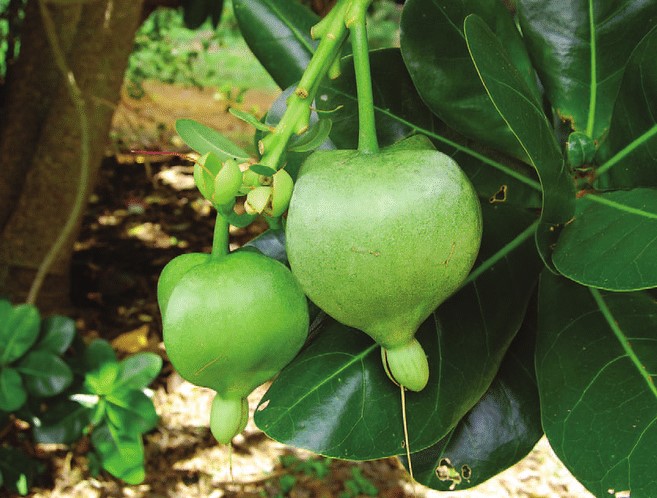
PNCV*vuabu
Flora
Fish-Poison-tree, bsl. Navele blong solwotaChapeau d'évêque, bsl. Navele blong solwota: arbreBarringtonia asiatica.
viha βiha noun
PNCV, POc*kayu
viji1 βiʧi
Averb, intransitive
embark, climb in (a boat)embarquer, monter (dans un bateau)
| Joro o sna o viji!Okay, you can come aboard! |
Bverb, transitive
embark ‹s.o.› on a boat
| Mo viji va p̈ir̄a mo viji mo var̄i-a mo ling-i-a mo sa lo m̈asap̈a.He brought the woman on board, and took her out towards the deep sea.Il embarqua la femme, il la prit avec lui (dans sa pirogue), et l'emmena vers le large. |
synonymling
viji2 βiʧi noun, relational
animaltailanimalqueue
| Om lesi-a viji-n hariv nohoni mo sohe ranga vi-aru.You can see the rat's tail resembles a branch of Casuarina.Tu constates que la queue du rat ressemble à une branche de Casuarina. |
vila βila adverb
vina βina noun, relational
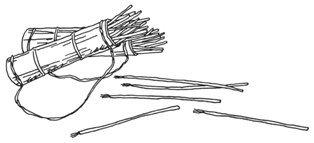
PNCV*vana-ishoot with bow and arrowPOc*panaqbow, to shoot
Redupvinavina
arrow. Formerly used, with the bow (p̈aka), either to fight (see vuro), or to hunt (see ele)flèche. Anciennement utilisée, avec l'arc (p̈aka), soit pour le combat (vuro), soit pour la chasse
| No-ku ta, o voro r̄e p̈aka-ku, r̄e vina-ku.Father, make me a bow and some arrows.Mon père, fabriquez-moi un arc et des flèches. |
vinano βinano noun
stranger, foreigner, esp. with relation to Araki or local island
| Vinano nira mo sivo mo poe mo re ha v̈e lesi-a m̈auri-ra, mo sa.Strangers who come (to Araki), and who want to know their destiny, go there (to Leruvahi).Les étrangers qui viennent (à Araki), et qui désirent interroger leur destinée, s'y rendent (à Leruvahi). |
vi-nini βinini noun
| R̄aju mo hese mo karumi-a laho vinini, mo re pana jau.Somebody was scraping the trunk of the palm-tree – maybe a coconut crab.Quelqu'un était là, qui grattait le tronc du palmier – sans doute un crabe de cocotier. |
| Mo var̄i-a rau vinini mo m̈a mo hasan-i-a mo ung lap̈a.He took a palm-leaf of the palmtree, and made a big fire with it.Il alla chercher une feuille de palmier, et alluma un feu qui brilla à grandes flammes. |
vi-olas βiolas noun
Seena-walas
Flora
Marking-out, a poison tree, bsl. NaolasiaGoudronnier, plante venimeuse, bsl. NaolasiaSemecarpus vitiensis.
vi-pue βipue noun
PNCV*bue(object of) bamboo
2 – object made of bamboo, e.g. a flute or a container
| Nam soro vi-pue.I am blowing into a bamboo (as a flute).Je souffle dans un bambou (en guise de flûte). |
| Mo var̄i-a levu ri mo huren-i-a lo vi-pue mo r̄un-i-a mo var̄i-a mo han-i-a.They take the breadfruit, put it in a bamboo, cook it, and finally eat it. |
vira βiɾa noun
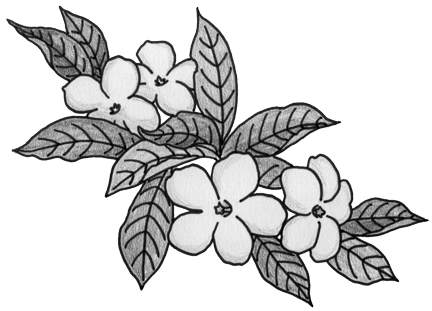
PNCV*vira
plantflower
| vira-naits flowersa fleur |
| Mo var̄i-a vira haviha mo huren-i-a lo par̄u-na.He picked a Malay apple-tree blossom and put it on his head.Il prit une fleur de pommier, et il se la mit sur la tête. |
vi-rara βiɾaɾa noun
PNCV*rara-viPOc*rarap
| rau raraleaves of Erythrina (name of a shining fish)feuilles d'Erythrina (nom d'un poisson brillant) |
viri βiɾi noun

Seeviriu(?) PNCV*kuriu
Fauna
dog
| Viri, r̄aju mo je han-i-a.People don't eat dogs.Le chien, ça ne se mange pas [les hommes / on ne le mange pas]. |
viriha βiɾiha adjective
1 – black
| r̄aju virihaa black man, a Melanesian (vs. tasale)un homme noir, un Noir |
| Mo posi mo viriha mo m̈a mo lulu; mo m̈ajim̈ajihi-ha.It would change from black to white, it was full of colours.Il se transformait, tantôt noir, tantôt blanc, tantôt de toutes les couleurs. |
antonymlulu
2 – black with dirt, dirty
| Nam varai kam̈im nam re ha v̈a hojo lim̈a-m̈im, pan lim̈a-m̈im mo viriha r̄o.I told you to wash your hands, but they are still black!Je vous avais dit d'aller vous laver les mains, mais elles sont encore noires ! |
synonymlumiha
synonymvsovso-ho
viris βiɾis verb, intransitive
PNCV*viritwist, plait, braid ; wring coconut creamPOc*piritwist
milk, squeeze out coconut cream (+ preposition lo)presser des deux mains la noix de coco râpée, pour en extraire le lait
| Om r̄e viris lo holo?Have you already squeezed out coconut milk ?As-tu déjà pressé le coco ? |
visa βisa interrogative
PNCV*visaPOc*pican
always preceded by subject clitichow manycombien, quelle quantité / quel nombre. Comme les numéraux, visa se conjugue en mode et en personne
| Nar̄u-m mo visa? — Nar̄u-ku mo rua.(lit.) How many are your children? — My children are two. |
visi βisi verb, transitive
PNCV*vivi-siwrap, bind
tie, bind, fix together; e.g. tie up the parts of a canoefixer, attacher, nouer ensemble ; e.g. attacher entre eux les éléments d'une pirogue
| Mo huren-i-a aka-na lo r̄asi mo visi-a mo visi-a otom̈e.He dragged his canoe down to the sea, then tied it up fast.Il tira sa pirogue vers la mer, puis la fixa complètement. |
visiho βisiho noun, relational
PNCV*visikoPOc*pisiko
Anatomy
flesh, meatchair, viande
| Om r̄e han r̄e visiho sip mo iso?Have you ever eaten lamb?As-tu déjà mangé de la viande de mouton ? |
| Mo han povi-a visiho-no.(The devil) devoured his flesh completely.Il dévora entièrement sa chair. |
vi-tapea βitapea noun
Flora
Sea trumpet, bsl. Burao blong solwota: treeBourao de mer, bsl. Burao blong solwota: arbreCordia subcordata.
vivi βiβi noun, relationalnoun
Anatomy
anclipsarchlèvres
seehuri-vivi~
Fish
Napoleonfish, reef fish, 120 cmNapoleon (angl. Napoleonfish), poisson récifal, 120 cmCheilinus undulatus.📙 Son nom est dû aux grosses lèvres qui le caractérisent.
📘 It takes its name from its remarkably thick lips.
vjan βʧan verb, transitive
trvjani-
2 – esphit the groundparticheurter le sol
| Mo rongo par̄u-n r̄ap̈ala-na mo rap̈as kaur̄a mo sivo mo vjan-i-a.Suddenly he heard his friend's head bounce up into the tree and fall to the ground.Soudain il entendit la tête de son ami rebondir en haut (dans l'arbre), et tomber jusqu'au sol. |
3 – [Subject: person throwing the object] throw or drop ‹s.th.› so as to hit (s.th. else, lo); strike[Sujet: personne qui lance l'objet] projeter ou laisser tomber (qqch) de manière à frapper (autre chose) ; asséner
| Mo var̄i-a no-no m̈aja, mo vjan-i-a lo par̄u-na.He seized his club, and smashed her head with it.Il saisit sa massue, et lui fracassa la tête avec. |
vokovoko βokoβoko adjective
Seevokevokeclean, white, innocentPNCV*vogewhitish, albino
clean, healthy; free from illnesspropre, sain ; exempt de maladie
| Hovi-na mo jiha povi, mo klin mo vokovoko.His scabies had totally disappeared, he was now clean and healthy.Sa gale avait complètement disparu, il était sain et propre. |
antonymlumiha
voli βoli verb, transitive
PNCV*voliPOc*poli
1 – buy, purchaseacheter
| Nam re na voli-a paniavu nohoni.I'd like to buy this pineapple.Je voudrais acheter cet ananas. |
vomahi βomahi noun
Birds
Green-winged Ground Emerald Dove, 26 cmColombe turvert, sorte de tourterelle, 26 cmChalcophaps indica.
voni βoni
von
vo
subordinator
1 – orou, ou bien
| Ha pa nak-i-a lo vuro vo r̄e hina sohe-na.He will be killed during a battle, or something of the kind.Il sera tué dans une bataille, ou quelque chose comme cela. |
| Mo m̈ar̄e vo mo m̈auri r̄o?Is it dead or is it still alive?Est-il mort ou vivant? |
2 – after a first clause in a questionintroduces question-final tags; i.e. for yes/no questions: "… or not?"; and for Wh- questions: "… or (who / what / when+)?"
| R̄av̈alu wik, jo pa usa vo jo je r̄e?Will it rain next week or not?La semaine prochaine, est-ce qu'il pleuvra ou non? |
| Ta mo rongo-jo vo mo je-r̄e?Did dad hear us? [he heard us or not]Est-ce que papa nous a entendus ? |
| Om v̈a lo ham̈ali vo om ta v̈e?Have you been in the men's house, or what? […or where are you coming from?]Tu es allé au nakamal ou quoi [ou bien d'où viens-tu] ? |
vono βono adjective
PNCV*vono-ti (?)blocked up, filled in, solid, dense
1 – far, remoteéloigné, situé loin
| R̄asi mo r̄oho jara vono.The sea is far (from there).La mer se trouve loin. |
vorai βoɾai noun, relational
Seevoraebrothers (old word)PNCV*vorabe born
1 – Ego M/Fbrother: generic term, including elder (r̄oha~) and younger (r̄asi~) brothersEgo H/Ffrère: terme générique, englobant frère aîné (r̄oha~) et frère cadet (r̄asi~)
| Nam levsei-a r̄aju mo hese, vorai-na mo lulu, nia r̄aju viriha.I know a man whose brother is white, yet he is black.Je connais quelqu'un, son frère est blanc, mais lui est noir. |
📙 Inclut les cousins parallèles, aussi bien patrilatéraux que matrilatéraux.
📘 Includes parallel cousins, either on the father's or the mother's side.
antonymve-sohor̄i~
voro3 βoɾo verb, intransitive
PNCV*vorabe born
reach the ground, hence be borntoucher le sol, d'où naître
| Nam voro Raki.I was born on ArakiJe suis né à Araki. |
voro2 βoɾo verb, transitive
make; do; build ‹house›faire, fabriquer; construire ‹maison›; confectionner
| No-ku ta, o voro r̄e p̈aka-ku, r̄e vina-ku.Father, make me a bow and some arrows.Mon père, fabriquez-moi un arc et des flèches. |
voro1 βoɾo verb, transitive
reach, hit ‹s.th.›atteindre
| Nam soro m̈aji nam voro.I shot at a bird and hit it.J'ai tiré sur un oiseau et je l'ai atteint. |
vosa βosa noun
| Vara mo sivo lo pere vosa, nko ha pa nak-i-ko ha pa hani-ko.If (the reed) falls on to a Terminalia tree, (this is the sign that) they will kill you, they will eat you. |
vose1 βose noun
PNCV*vosePOc*pose
oar, paddle, used with the canoe (aka)
| Mo r̄ai-a vose m̈ar̄a jo pa sua nia.He carved an oar so that he could paddle with it.Il tailla une pagaie, pour pouvoir naviguer avec. |
vunggo~ βuŋgo noun, relational
AnthropologyThis relationship involves a high degree of mutual respect.
vunguvungu~ βuŋuβuŋu noun, relational
| rai vunguvungu-kumy family, my relativesma famille, les miens |
| kam̈am povi rai vunguvungu-ni Moliall of us, Moli's familynous tous, la famille de Moli |
seer̄ahisa~
vuro βuɾo noun
fight, battle, warcombat, bataille, guerre
| Ha pa nak-i-a lo vuro vo r̄e hina sohe-na.He will be killed during a battle, or something of the kind.Il sera tué au combat, ou quelque chose de ce genre. |
vuruvuru βuɾuβuɾu noun
vur̄ivur̄ia βuriβuria adjective
PNCV*vutimountain
high, steep, like a mountain (vur̄uvur̄u); going very highen hauteur, escarpé, comme une montagne (vur̄uvur̄u)
| Mo vur̄ivur̄ia-ha mo sa kaur̄a.(The stone) soars up high in the sky.(la pierre) s'élance et monte très haut. |
📙 Reçoit le suffixe -ha.
📘 Receives suffix -ha.
vuso βuso adjective
blind
| Nia mo vuso, mo je levse lesi r̄e hina.He's blind, he can't see anything.Il est aveugle, il ne peut rien voir. |
vutiana βutiana adjective
1 – +plural referenta lot, plenty; too many+plurielnombreux, beaucoup
| hina vutianamany things |
| Mohi mo vutiana.There are many mosquitoes! [m. are numerous]Il y a beaucoup de moustiques ! |
| Niko r̄aju tavtavu, m̈ar̄a no-m vatu vutiana.You are a rich man, because you have a lot of money.Tu es un homme riche, car tu as beaucoup d'argent. |
v̈a ð̼a
Averb, intransitive
1 – go (somewhere)aller, se rendre (qq part)
| Va r̄aju mo le mle, mo le v̈a lo ima-n r̄am̈a-na.The young man turned round and went back to his father's house.Le jeune homme s'en retourna, et regagna la maison de son père. |
| Ha v̈a, ha v̈a, ha ku r̄e ai.Go on, go and fetch some water.Allez, allez donc chercher de l'eau. |
2 – after vb of mvttowards, in the direction of[après vb de mvt] en se dirigeant vers, en direction de
| Nia mo le sua mo v̈a lo ima-na.He started paddling again in the direction of his house.Il se mit à nouveau à pagayer en direction de sa maison. |
3 – keep going in a certain direction, pursue one's route; continue a movementcontinuer un mouvement, poursuivre sa route
| Nko v̈a!Go on, keep on your track (since you don't want to take me with you)Vas-y donc, continue ton chemin (puisque tu refuses de me prendre avec toi) |
| Mo le karu mo v̈a mo les ivua.He swam on a little, until he saw the Turtle.Il nagea encore un peu, jusqu'au moment où il aperçut la Tortue. |
| Mo v̈a v̈a mo v̈a r̄kel-i-a tar̄auta.He went on swimming, until he reached the shore.Il continua à nager, nager, jusqu'à ce qu'il atteignit la rive. |
4 – after a verb V1continue an action, with or without a spatial movementaprès un verbe V1continuer une action
| Mo vaver̄e mo v̈a r̄o.He carried on singing.Il continuait à chanter. |
| Mo si mo r̄olu, mo v̈ei-a sohe mo v̈a, aka mo r̄a hetehete.Whilst travelling all together, they carried on (bringing aboard other passengers), until the canoe became too small for them all.Tout en voyageant tous ensemble, ils continuaient de la même façon (à accueillir d'autres passagers), tant et si bien que la pirogue se fit de plus en plus petite. |
5 – remain in the same situation, letting a certain time go by; hence laterdemeurer dans la même situation, en laissant passer un certain temps ; d'où plus tard
| Mo v̈a lo ran mo hese, mo le sa mo varai no-no ta.(he was sad) He remained in this state [lit. he/it went], and one day he decided to go home and speak to his father.(il était triste) Il resta dans cet état [lt. il allait], et un beau jour il retourna parler à son père. |
Synt.It is unclear whether the subject of v̈a is the agent of the action ("he went on like this") or the action itself ("it went on like this").
seesna
6 – impersonal phrase(mo v̈a) a long time later, eventually[sans sujet précis] (mo v̈a) au bout d'un certain temps, longtemps, ensuite
Bdirectional
used as a Directional, without a subject pronounemploi comme Directionnel, sans pronom sujet
1 – over there, in the distance. Directional marking distance, combined with deicticslà-bas, au loin. Directionnel marquant la distance, et combiné aux déictiques
| P̈ir̄a mo hese mo r̄oho r̄av̈al jingo mle v̈a.There was a woman who lived over there on the other side of the cape.Il y avait une femme qui habitait de l'autre côté du cap, là-bas. |
2 – Directional referring to an outward movement (vs. m̈a) and forward (vs. sa 'upward', si 'downward')Directionnel signifiant un mouvement vers l'extérieur (opp. m̈a) et vers l'avant (opp. sa 'vers le haut', si 'vers le bas')
| M̈ala mo kla v̈a mo lesi-a jam.The hawk looked in front of him and saw a yam.Le faucon regarda [devant lui], et vit une igname. |
📙 Ce directionnel se combine avec certains verbes (kla 'regarder', lpo 'essayer') et d'autres mots.
📘 This directional is combined with certain verbs (kla 'look', lpo 'try') and others.
3 – Directional referring to a continuous movement, an action going onDirectionnel signifiant un mouvement continu, la poursuite d'une action
| Mo avuavu v̈a mo m̈a m̈a, mo le voro kar̄ano lo lepa.(the reed) continues its flight, comes closer until it reaches the ground.(le roseau) continue son vol, et s'approche jusqu'à atteindre le sol. |
| Mo v̈ei-a v̈a vara uluvo mo le smat.He went on (acting) this way, until the young man became a beautiful boy again.Il continua (d'agir) ainsi, jusqu'à ce que le jeune homme redevînt beau garçon. |
v̈aha1 ð̼aha prefix
POc*paka-Causative
1 – (n) times. Multiplicative prefix, counting times an action is repeated(n) fois. Préfixe multiplicatif, comptant les occurrences d'une action
| Nanov, mo usa v̈aha-rua.Yesterday, it rained twice. |
2 – prefix deriving ordinals from the corresponding cardinalpréfixe dérivant les numéraux ordinaux à partir du cardinal correspondant
| naivou-na v̈aha-r̄oluhis third wifesa troisième femme |
| tapu-ku v̈aha-ruamy great grandfather [my twice-grandfather], my great grandsonmon bisaïeul [mon aïeul deux fois], mon arrière-petit-fils |
synonymha-_4
v̈ahani2 ð̼ahani verb, transitive
Seethacani
hani
feed
| Nam v̈ahani-a pla-ku to.I am feeding my fowls.Je nourris mes poules. |
| Ela mo v̈ahani R̄al.She's feeding Ralph.Ella a donné à manger à Ralph. |
v̈alalap̈a ð̼alalat̼a adjective
big, large, esp. when plural or collectivegrand, spéc. avec une signification de pluriel ou de collectif
| r̄aha v̈alalap̈abig ones, those that are bigles grands, ceux qui sont grands |
| Via v̈alalap̈a, rau-na r̄a v̈alalap̈a.The big taro has big leaves.Le grand taro a de grandes feuilles. |
v̈a lej ð̼a leʧ verb, intransitive
1 – go by, pass through (a place), go (somewhere)passer par (un endroit), se rendre (qq part)
| O v̈a lej v̈e? — Na v̈a lej v̈aha-sun.Where will you go through? — I'll go that way.Par où passes-tu? — Je vais passer par là-bas. |
2 – make a detour, move away from the main track, disappear out of sightfaire un détour, partic. de telle façon que l'on est perdu de vue ; s'écarter de la route principale, disparaître de la vue
| Mo le v̈a v̈a sur̄-i-a jingo hosun mo sivo mo pos mo v̈a lej.Again he sailed alongside the cape; after a while, he started tacking, and disappeared.À nouveau, il se mit à longer le cap; au bout d'une certaine distance, il se mit à virer de bord, et disparut à l'horizon. |
seev̈a
v̈ano ð̼ano
v̈a
verb, intransitive
PNCV*vanoPOc*pano
v̈aoro ð̼aoɾo verb, intransitive
Seethathaoretrouble
Redupv̈av̈aoro
make noise, be noisyfaire du bruit, être bruyant
| Nam je poe-i-a mara variri mo v̈av̈aoro.I don't like it when the kids are noisy.Je n'aime pas que les enfants fassent du bruit. |
antonymr̄oho m̈alum (‹ m̈alum)
v̈apa ð̼apa
vapa
noun

1 – cavegrotte, caverne
| V̈apa mo hese, kesini r̄avui lo ima-ku.There is a cave, here close to my house. |
📘 The village of Sope has a very large cave, full of small black bats (vuruvuru) that children play with.
Anthropology
2 – extended family clan, a major social unit in Araki
📘 To each clan, is supposed to correspond one of the villages in the island of Araki: e.g. the village of Sope belongs to Lele Moli and his extended family (v̈apa): i.e. his sons, their wives and children.
v̈ar̄i ð̼ari numeral
PNCV*vatiPOc*pati
fourquatre
| ha-v̈ar̄i ranthe fourth day, Thursday |
| r̄aju mo ngavul v̈ar̄iforty people |
v̈asusu ð̼asusu verb, transitive
PNCV*vasusugive birth, lay egg
trv̈asui- |ax{(?)}
womanbeget, give birth tofemmeenfanter
| Naivou-ku mo v̈asu-i nar̄u-ku.My wife has just given birth to my baby.Ma femme vient de mettre au monde mon enfant. |
v̈e1 ð̼e interrogative
POc*pai
1 – where. Interrogative adverb of placeoù. Adverbe interrogatif locatif
| Moli mo r̄oho r̄o v̈e? — Nia mo v̈a lo ham̈ali.Where's the chief? — He's gone to the nakamal.Où se trouve le chef? — Il est (allé) au nakamal. |
| O v̈a lej v̈e? — Na v̈a lej v̈aha-sun.Where will you go through? — I'll go that way.Par où passes-tu? — Je vais passer par là-bas. |
v̈ei2 ð̼ei
v̈e
verb, transitive
PNCV*vaimake, do, be
Redupv̈ev̈e
1 – make ‹s.th.›faire, fabriquer (qqch)
| Mo r̄ai-a aka inia, mo v̈e hotom̈e sohe aka.He carved himself a canoe, and made it just as if it were a (real) canoe.Il se tailla une pirogue, faisant tout ce qu'il fallait comme pour une (vraie) pirogue. |
| R̄aju mo v̈ei-ko, nia Supe.The one who created you is God.L'être qui t'a créé, c'est Dieu. |
2 – gendo, actgénfaire, agir
| Om v̈ei-a sa r̄o?What are you doing ?Qu'est-ce que tu es en train de faire ? |
| Mo v̈ei povi-a rai hina hosun.He did all these things.Il fit entièrement toutes ces choses. |
3 – + (mo re +) Irrealissee to it that; be the cause of ‹s.th.›; provoke. Factitive valuefaire en sorte que (+ mo re + Irrealis). Valeur de Factitif
| R̄am̈ar̄e mo v̈ei-a mo re jo je usa.The spirits are the cause that [lit. are making] there is no rain.Les esprits font qu'il ne pleut pas. |
| Jo pa v̈ei-a ai jo wet-i-a as.He'll wet the rope. [lit. He'll make that some water wet the rope]Il mouillera [il fera que l'eau mouille] la corde. |
| M̈ar̄a p̈ir̄a hosun mo r̄e v̈ei-a mo r̄e lokoru mo iso.Because that woman had already made him so angry. [made that he was angry]En effet, cette femme était la cause de sa colère. |
v̈e lesi ð̼e lesi verb, transitive
v̈er̄ali ð̼erali noun
PNCV*vetali
| V̈er̄al ne mo je v̈er̄al hanhan.This banana is not edible.Cette banane-ci n'est pas une banane comestible. |
| v̈er̄ali tasale[Westerners' banana] long, sweet banana, especially appreciated by Europeans[banane des Blancs] banane longue et sucrée, appréciée particulièrement des Européens |
📙 Il existe de très nombreuses variétés de bananes au Vanuatu, dont la plupart sont faiblement sucrées, et utilisées plutôt comme légume.
📘 There are a large number of varieties of bananas in Vanuatu, most of which are not very sweet, and are used mainly as a vegetable.



